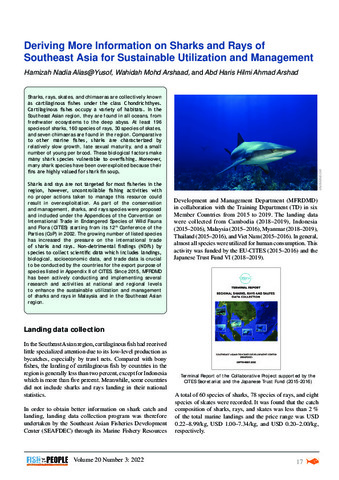| dc.description.abstract | Sharks, rays, skates, and chimaeras are collectively known as cartilaginous fishes under the class Chondrichthyes. Cartilaginous fishes occupy a variety of habitats. In the Southeast Asian region, they are found in all oceans, from freshwater ecosystems to the deep abyss. At least 196 species of sharks, 160 species of rays, 30 species of skates, and seven chimaeras are found in the region. Comparative to other marine fishes, sharks are characterized by relatively slow growth, late sexual maturity, and a small number of young per brood. These biological factors make many shark species vulnerable to overfishing. Moreover, many shark species have been overexploited because their fins are highly valued for shark fin soup.
Sharks and rays are not targeted for most fisheries in the region, however, uncontrollable fishing activities with no proper actions taken to manage this resource could result in overexploitation. As part of the conservation and management, sharks, and rays species were proposed and included under the Appendices of the Convention on International Trade in Endangered Species of Wild Fauna and Flora (CITES) starting from its 12th Conference of the Parties (CoP) in 2002. The growing number of listed species has increased the pressure on the international trade of sharks and rays. Non-detrimental findings (NDFs) by species to collect scientific data which includes landings, biological, socioeconomic data, and trade data is crucial to be conducted by the countries for the export purpose of species listed in Appendix II of CITES. Since 2015, MFRDMD has been actively conducting and implementing several research and activities at national and regional levels to enhance the sustainable utilization and management of sharks and rays in Malaysia and in the Southeast Asian region. | en |

